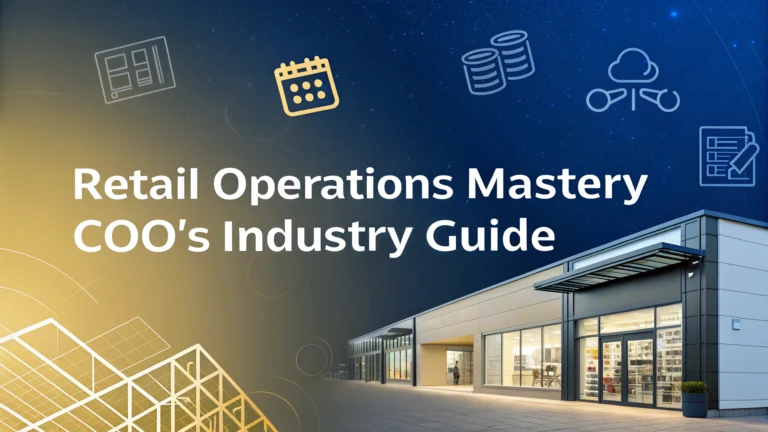The role of Chief Operating Officer in retail operations requires a unique blend of strategic thinking, operational excellence, and leadership capabilities.
Successful retail COOs must balance customer experience, supply chain efficiency, and technological integration while maintaining profitability and growth.
This guide covers key aspects of retail operations management from a COO perspective, providing practical strategies for optimization and success.
Key Responsibilities of a Retail COO
- Supply chain optimization and vendor management
- Store operations oversight and standardization
- Inventory management and logistics coordination
- Technology implementation and digital transformation
- Team development and performance management
- Financial planning and cost control
Supply Chain Excellence
Implement real-time inventory tracking systems to maintain optimal stock levels across all locations.
Develop strong relationships with multiple suppliers to ensure supply chain resilience.
Create contingency plans for supply chain disruptions, including alternative sourcing strategies.
Store Operations Management
| Focus Area | Action Items |
|---|---|
| Staff Management | Implement structured training programs, performance metrics, scheduling optimization |
| Store Layout | Regular planogram updates, traffic flow analysis, merchandising standards |
| Customer Service | Service standards, feedback systems, response protocols |
Technology Integration
Select and implement integrated POS systems that provide real-time sales data and inventory management.
Adopt predictive analytics tools for demand forecasting and inventory optimization.
Implement customer relationship management (CRM) systems to track and enhance customer experiences.
Performance Metrics to Monitor
- Sales per square foot: Target industry benchmarks of $300-$500
- Inventory turnover: Aim for 4-6 turns annually
- Customer satisfaction: Maintain NPS scores above 50
- Employee retention: Target 80% or higher annually
- Operating margin: Industry standard 20-30%
Risk Management Strategies
Develop comprehensive loss prevention programs combining technology and staff training.
Create business continuity plans for various scenarios including natural disasters and market disruptions.
Implement robust cybersecurity measures to protect customer data and business operations.
Professional Development Resources
- National Retail Federation – Industry updates and certification programs
- Retail Industry Leaders Association – Executive education and networking
- Retail Council – Research and best practices
Moving Forward in Retail Operations
Focus on building resilient operations that can adapt to changing consumer behaviors and market conditions.
Invest in employee development and technology that enhances both customer experience and operational efficiency.
Maintain strong relationships with key stakeholders while continuously seeking opportunities for innovation and improvement.
Financial Planning and Control
Establish robust budgeting processes aligned with strategic objectives and market conditions.
Implement rolling forecasts to adjust operations based on real-time performance data.
Create detailed cost management strategies across all operational areas.
Key Financial Controls
- Regular variance analysis and reporting
- Cash flow optimization procedures
- Capital expenditure evaluation framework
- Margin management protocols
Digital Transformation Initiatives
Develop omnichannel capabilities to seamlessly integrate online and offline operations.
Implement AI-driven solutions for inventory optimization and customer insights.
Create mobile-first solutions for both customer engagement and operational efficiency.
Sustainability and Corporate Responsibility
- Implement eco-friendly packaging solutions
- Develop sustainable supply chain practices
- Create energy efficiency programs for stores
- Establish community engagement initiatives
Crisis Management Protocol
| Crisis Type | Response Strategy |
|---|---|
| Supply Chain Disruption | Alternative supplier activation, inventory reallocation |
| Technical Outages | Backup systems deployment, manual operation procedures |
| Public Relations Issues | Communication protocols, stakeholder management |
Building Future-Ready Retail Operations
Success in retail operations requires constant evolution and adaptation to changing market dynamics. COOs must focus on building agile organizations capable of responding to new challenges while maintaining operational excellence.
Prioritize investments in technology and talent development to create sustainable competitive advantages. Maintain a balance between short-term performance and long-term strategic objectives.
Remember that operational excellence is an ongoing journey, not a destination. Stay informed about industry trends, maintain strong stakeholder relationships, and continue to innovate in processes and systems.
FAQs
- What are the primary responsibilities of a retail COO?
A retail COO oversees daily operations, supply chain management, store performance, inventory control, staffing, and implementation of business strategies while ensuring operational efficiency and profit optimization. - How does a retail COO differ from other C-suite executives?
A retail COO focuses on operational execution while the CEO handles overall strategy and vision. The COO typically manages day-to-day operations, whereas CFOs handle financial matters and CMOs focus on marketing initiatives. - What key performance indicators (KPIs) should retail COOs monitor?
Essential KPIs include sales per square foot, inventory turnover, same-store sales growth, customer satisfaction scores, labor costs, shrinkage rates, and operational efficiency metrics. - How can retail COOs effectively manage multi-location operations?
Through standardized operating procedures, centralized management systems, regular performance monitoring, consistent communication channels, and implementation of technology solutions for real-time oversight. - What role does technology play in modern retail operations management?
Technology enables inventory management systems, point-of-sale analytics, customer relationship management, supply chain optimization, workforce management, and data-driven decision making. - How should retail COOs approach supply chain optimization?
By implementing demand forecasting, maintaining strong vendor relationships, utilizing inventory management systems, establishing efficient distribution networks, and developing contingency plans for supply chain disruptions. - What strategies help in reducing operational costs while maintaining service quality?
Implementing lean management principles, optimizing workforce scheduling, automating routine processes, negotiating better vendor contracts, and utilizing energy-efficient systems and practices. - How can retail COOs ensure consistent customer experience across multiple locations?
Through standardized training programs, regular audits, mystery shopping programs, customer feedback systems, and maintaining consistent brand standards and operating procedures. - What are the best practices for managing retail workforce productivity?
Implementing effective training programs, using data-driven scheduling, setting clear performance metrics, providing regular feedback, and maintaining appropriate staffing levels based on demand patterns. - How should retail COOs handle crisis management and business continuity?
By developing comprehensive contingency plans, maintaining emergency protocols, establishing clear communication channels, and ensuring proper insurance coverage and risk management strategies.
